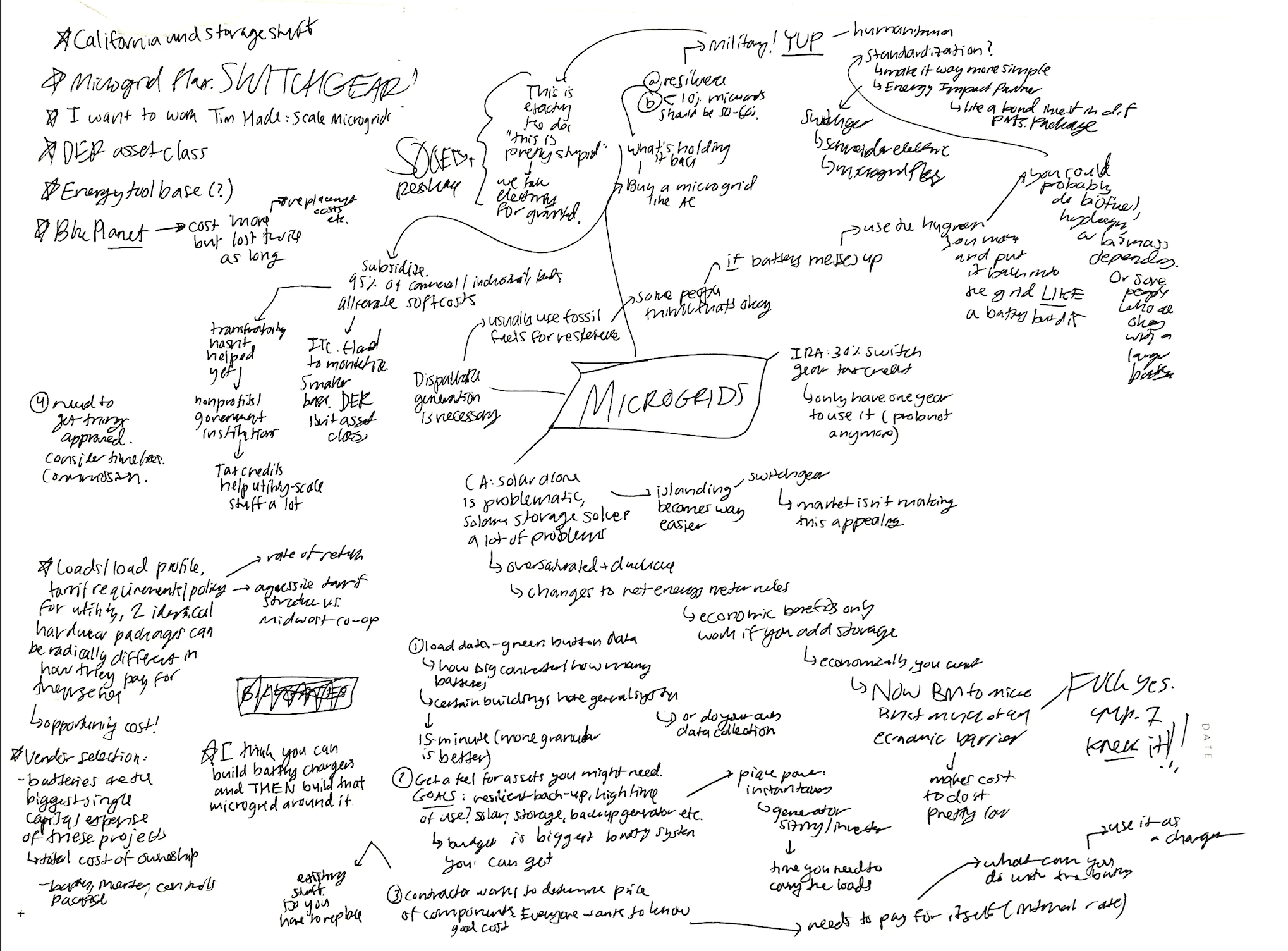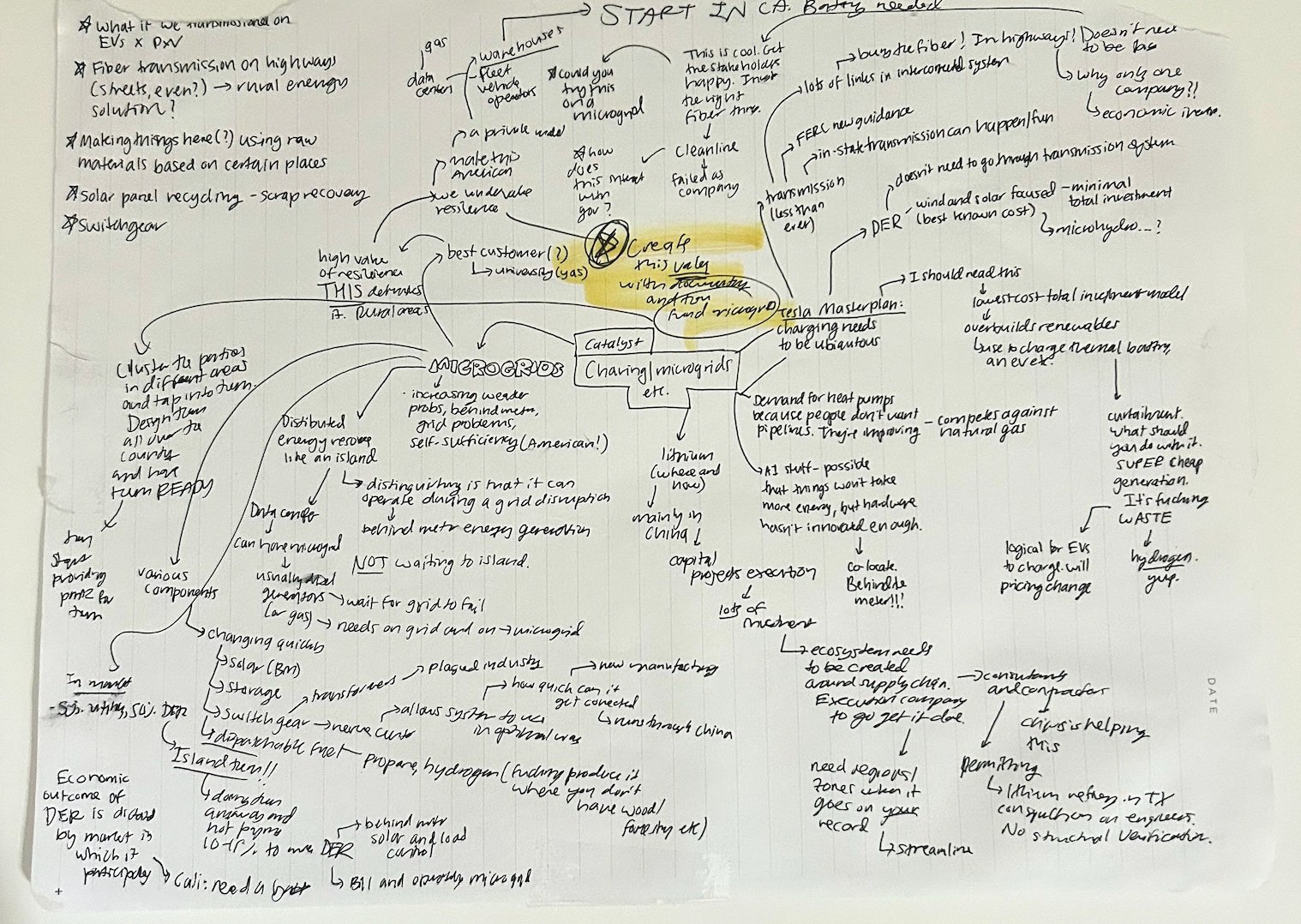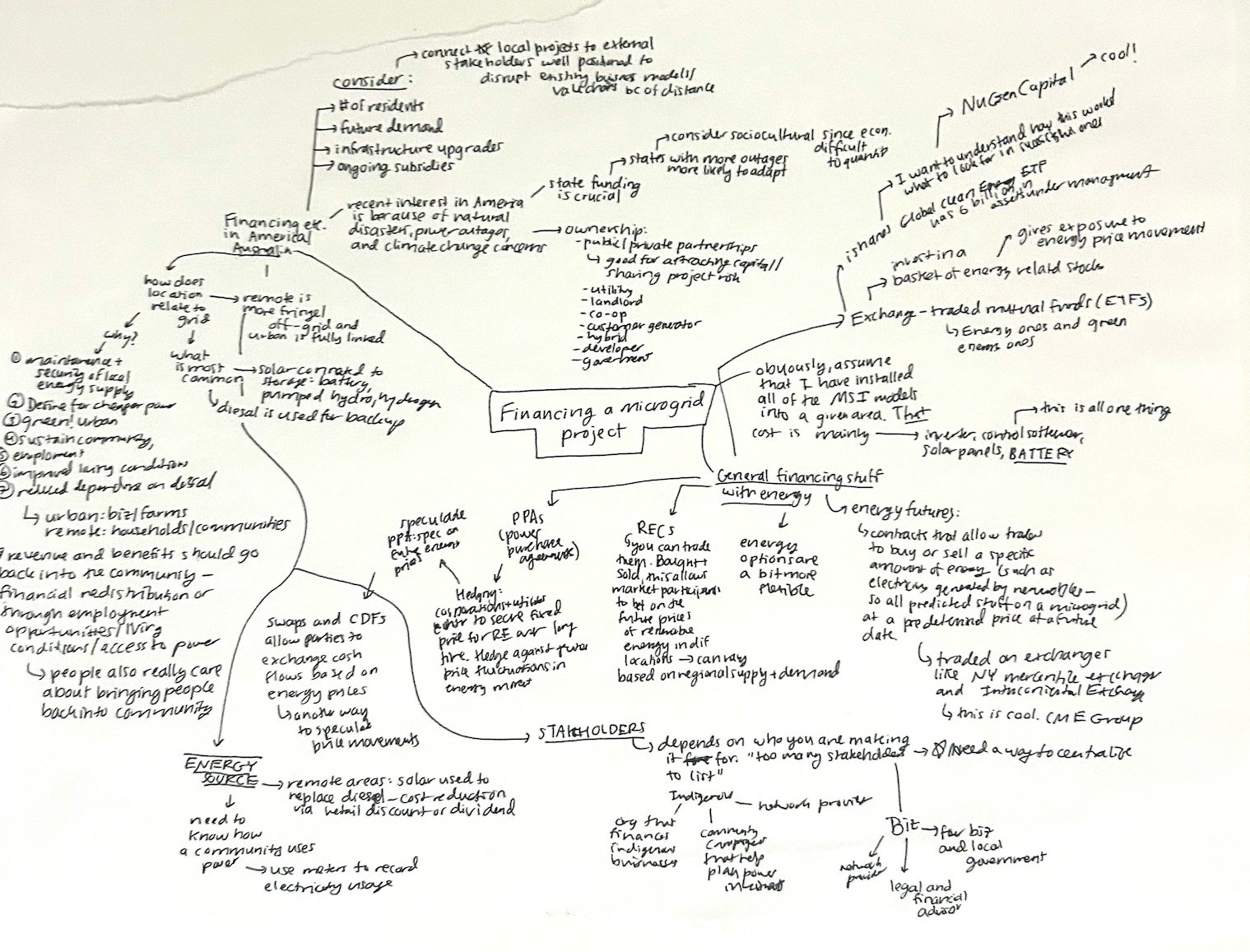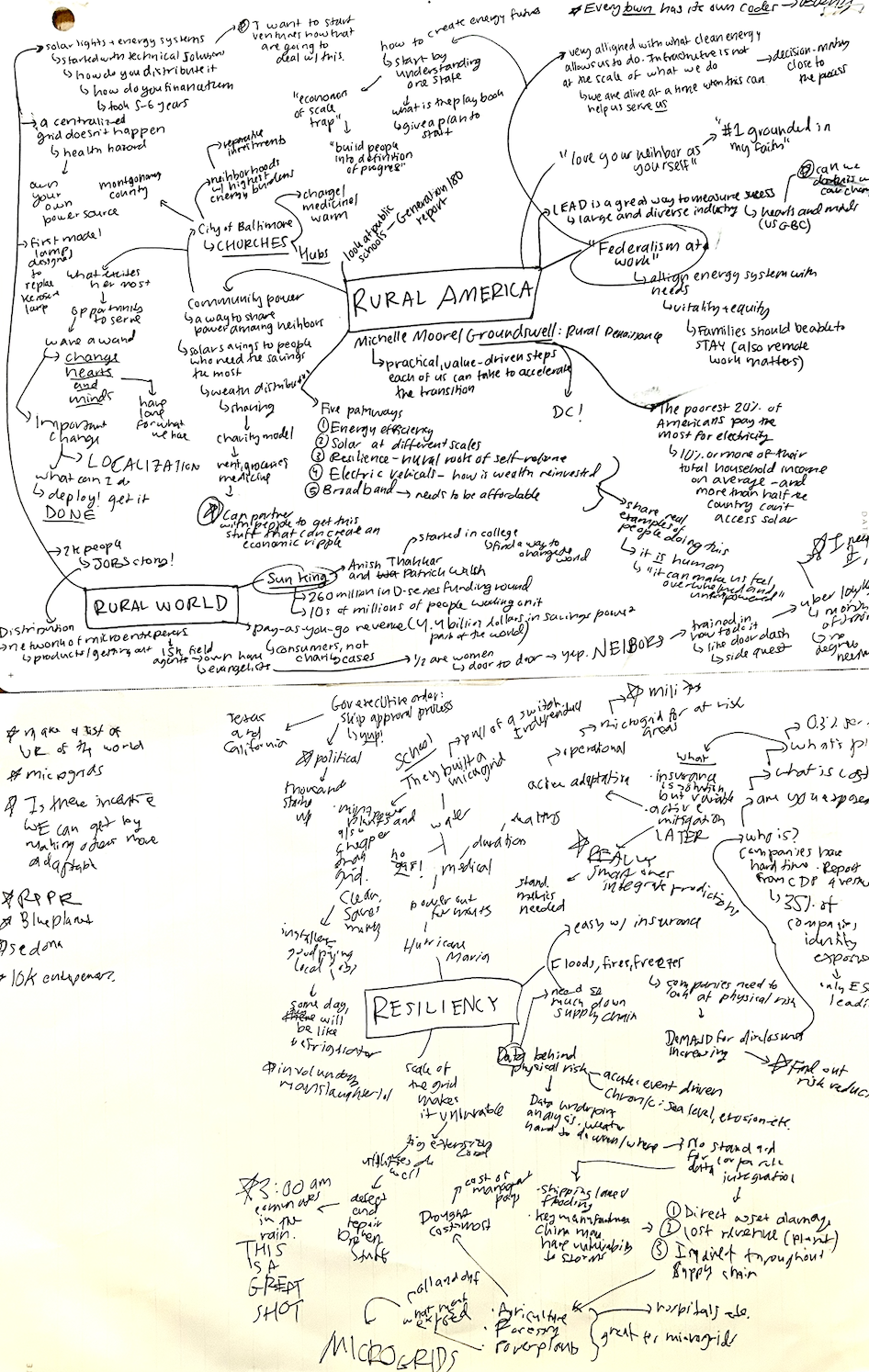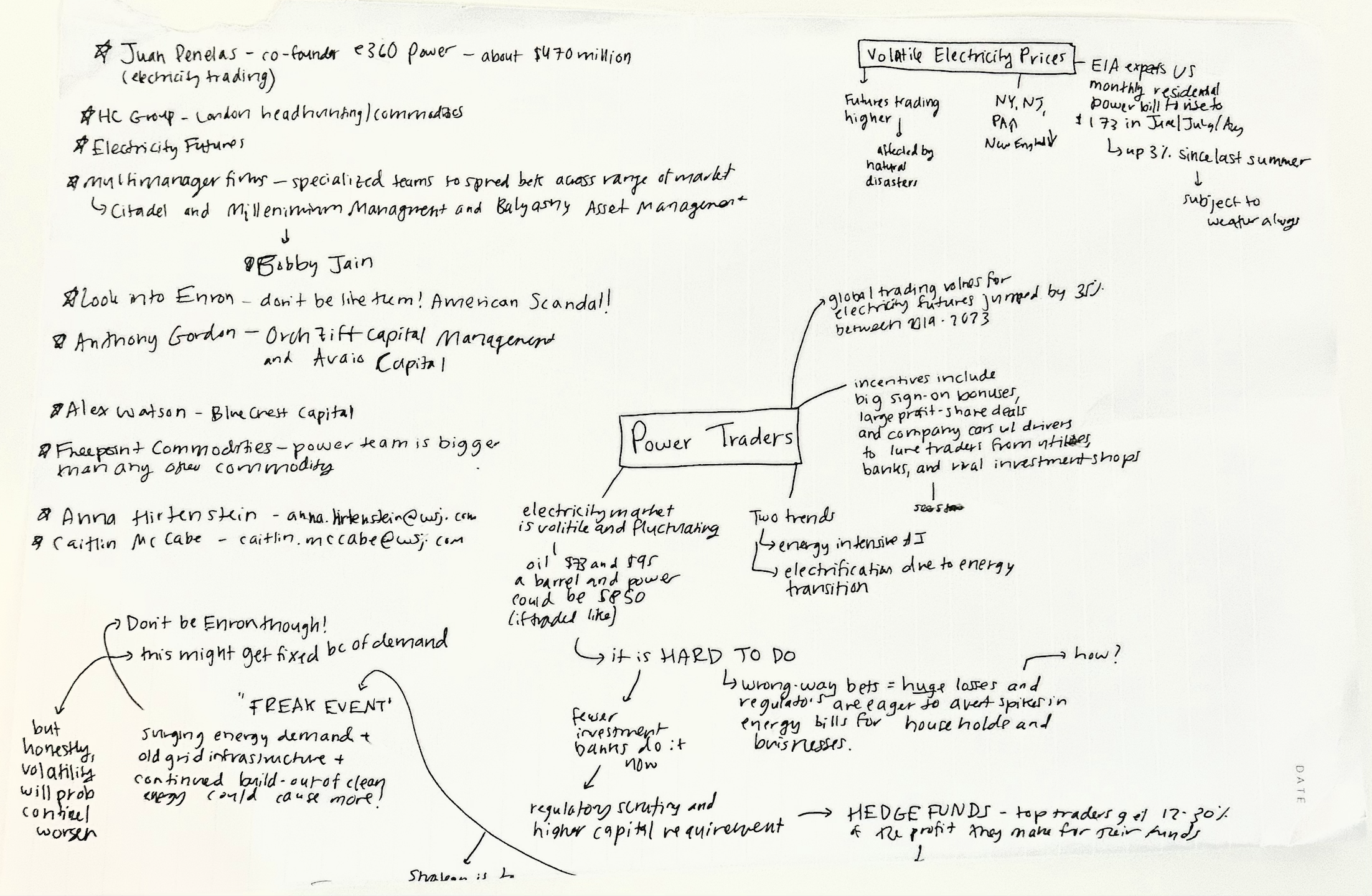Inevitability is our favorite word.
The battery storage market is going from $100B to $1.5T across the decade. We know as much about battery storage as anyone our age and frankly, we’re early to the game.
Elson became obsessed with the insane value of batteries through a year of traveling and research. She convinced Elio, who did his own research, saw what she saw, and joined diligently. Noah already makes money on batteries. He wants to buy one, much like real estate, as soon as he can.
We are deeply technical about the problem we’re trying to solve, and we’re determined to solve it. We turned down enticing jobs to work on Powertown full-time this summer and are putting together a terrific advisory board to help us take it the distance.
Industry leaders of all types believe in us, understand the transformational potential of our idea, and are convinced we’ll make it happen. This is high-stakes checkers and we’re ready to play chess.
We know a lot. We have integrity, obsession, and persistence. We like to bet on ourselves, and we like to win. And we have a pretty good track record.
Founding Team: all have obsession/knowledge/ experience
-
Junior at Harvard (‘27)
Alright, this is a ramble, but I think a necessary one. No bullshit. I am in love with the clean energy transition, skeptical of the “problems within the solution,” and persistent and honest with myself about solving them. That’s what I’ll try to relay here. Decarbonizing the United States and enabling the clean energy transition feels like a string pulling me toward creative thinking and diligent leadership. It has led me to understand new topics and disciplines very thoroughly at a very rapid pace. Here are some examples:
I’m the Co-President of the Harvard Undergraduate Clean Energy Group (huceg.org), a 350-person powerhouse that was half the size when I took over. We went from seven programs to 15 in under a year — and our thesis is as followed: let’s be a horizontally integrated powerhouse that allows you to do to consulting, finance, engineering, entrepreneurship etc but with PURPOSE behind it. We want to make the clean energy transition obvious, irresistible, and inevitable. This requires training our leadership and membership to bind themselves to this cause. We also have big parties sometimes. Buy in. Believe you can decarbonize the world because you’re crack smart, you can, and it can also serve you professionally.
I moved to New York the summer after my junior year of high school and produced a sold-out (300+ tickets) my own two-act political drama off-Broadway— not because I care about theater, but because at the time, there was a problem with storytelling in the space. I took courses on playwriting, taught myself to direct, hired actors, created an LLC, put a team of motivated students together to fundraise 20, 0000 and made it happen because I was obsessed, and I got everyone else obsessed. It was a story that needed to be told.
Last summer, I traveled the country on a $5,000 grant, trying to find the “American” approach to the energy transition. Europe does it for the climate, China does it for the global market control, why do we do it? I locked myself in a café and cold emailed hundreds of energy pioneers (contacted local agencies, traced federal funds, went through coalitions, emailed journalists etc). I found myself watching a rodeo with veterans designing microgrids in Oregon, eating with Catholic farmers and ex-coal miners enabling distributed solar in West Virginia, teaching kids about clean tech with a battery start up in Tennessee, and learning about virtual power plants and grid infrastructure with Conservative advocates in Houston.
Following this experience, I just launched a documentary project to depoliticize clean energy (solutionistsdoc.org). Excited to see that get going. Messaging matters and the project is VERY synergistic with Powertown.
I returned to Harvard obsessed with an idea I had thought of in Oregon and doubled down on through reading around 45 research reports, conducting my own research at the Kennedy School, and working at EV start-up itselectric. My life became about the problem within the energy solution: the grid. I took courses like an Electricity Law class at HLS, an EV seminar, an MIT Mobility Ventures class, and a History of Energy class (and some more basic ones).
Powertown is about knowing how the grid actually works. It’s about understanding demand charges and tariffs, the 13 value streams of a battery, and how to arbitrage electricity. It’s about knowing how to make a battery asset class profitable, predictable, and essential. I consider myself a technical founder because I –– through months of research, policy consulting, and working at a start-up myself, understand why clean, distributed energy isn’t scaling. So we set out to make it obvious and irresistible to the market.
Powertown started in a very different place. Elio hopped on board about five months in, and we have had hundreds of conversations to get to the idea we have now. We both just turned town multiple job offers, and we’re making this happen over the summer. And we’re so lucky to have Noah! We won’t stop until we’re the most successful battery enabling, customer-centric solution in the country — not because it’s obvious, but because it’s urgent and hard, and you have to be a little egomaniacal to think you can do it.
-
Senior at Harvard (‘26)
In my early adulthood, I repeatedly gravitated towards self-led projects: I struggled to dream about traditional paths and my proudest work came from risk-taking and working with others to make givens better. From my Bar Mitzvah speech on the need for collective learning in solving humanity’s largest problems to my journalism on Street Vendors that helped pass a city council bill and earned me a spot on Scholastic’s Best Teen Writing of 2021, I’ve always prioritized forward-thinking over participating in the status quo. I arrived at Harvard determined to break with corporate job expectations and go all-in on building the future. Powertown is the latest, greatest attempt: a channel through which Elson, Noah, and I will scale an inevitable clean energy solution and demonstrate our life-long commitment to transforming the aging U.S. energy grid. Powertown is building a new coalition around battery storage solutions but draws from our personal histories with energy and decarbonization. The son of a sustainability architect, my childhood home was a shrine to energy-efficiency.
I’ve toured wind farms in Amarillo, Texas, captured hundreds of photos of metering systems in Mexico, and spent two weeks in Denmark learning from battery storage leaders at DTU and the city government. I also study the stuff, wrapping up my degree in policy and energy from Harvard where I worked on policy projects for the White House and United Nations and am now writing an honors thesis on AI data center energy use. I believe that the most durable battery storage solutions – balancing tariffs, code, permitting, and jurisdiction – will come from teams that also understand where the battery policy landscape is headed. Elson and I regularly talk about the battery market on a 20-year timescale.
Clean energy is in our DNA and its why Powertown is inevitable. It’s why we’ve turned down exciting jobs to work on Powertown this summer. We’re the team to make it happen and we’re building up a coalition around us to make sure we do it right and fast.
The foundation of Powertown is our genuine care for what we’re building, but our motor is focus, getting shit done, and bsessively learning. I’m a repeat cofounder, having worked with two veteran founders and life-long mentors on a beverage startup that received VC offers; last summer, I helped one of them build venture arms out of her 100-employee supplement facility. I also spent a year building a scout program for a VC called Oceans, investing in a $1B+ unicorn during their seed round. Powertown is the unity of clean energy urgency with this startup tenacity. Working together is an utter joy and we have a vast network to lean on as we take this for the long haul. The time is right and we will prove that the idea is right, too.
-
Junior at Princeton (‘27)
I’m Noah Hiers, Co-Founder and Chief Technology Officer of Powertown, where I lead product development, software architecture, and optimization strategy for mobile battery storage systems.
I’m currently a Princeton University electrical and computer engineering student. My journey into the energy sector started unexpectedly during my freshman year when I connected with industry veterans at muGrid Analytics. I joined as a Software Engineer intern and quickly became the lead developer on high-impact projects focused on optimizing the control and dispatch of Distributed Energy Resources (DERs) for multi-million-dollar, government-funded initiatives. At muGrid, I built scalable software systems using Python, Flask, RabbitMQ, Kafka, and PostgreSQL, driving innovation in automated energy dispatch, DER optimization, and EV charger integration.
Beyond muGrid, I expanded my technical expertise as a Machine Learning Engineer at Skygaze (Y Combinator W24), where I applied deep learning to cold-start recommendation algorithms. I also served as a Teaching Assistant for Princeton’s Freshman Scholars Institute, mentoring incoming engineering students in programming, math, and physics.
My academic training includes coursework in algorithms, electronic circuit design, and programming systems, but the turning point for me was Professor Jesse Jenkins’ “Applied Optimization for Energy Systems Engineering” course. It completely reshaped how I think about the grid, ERCOT, base load economics, and complex energy modeling — solidifying my commitment to tackling some of energy’s hardest challenges.
Now at Powertown, I’m combining my technical experience, systems thinking, and drive to build practical solutions for dynamic energy marketplaces. And honestly, the way this all came together still feels surreal.
Board of Advisors (years of industry experience )
-
My background includes 22 years of experience working in the military sector, where I served as a lead electrical systems engineer, lead project engineer and lead project engineer. I led teams of over 80 personnel in the design, integration, deployment, installation, and maintenance of complex systems for the U.S. Army across Afghanistan, Iraq, and parts of Africa. Through this work, I expanded into the energy storage and renewable power sectors, supporting critical defense systems such as C5ISR (Command, Control, Communications, Computers, Combat Systems, Intelligence, Surveillance, and Reconnaissance) platforms, weapons systems, high-energy lasers, and base camps.
In 2014, I joined an early-stage startup in the renewable energy sector, where I built a network of customers, partners, mentors, and technical collaborators. Later, I co-founded a company in Huntsville, Alabama, which grew from two people to a $10 million business with over 30 employees and six long-term U.S. Army contracts. These contracts focused on developing hybrid power systems for weapons platforms, radar systems, and portable tower-based surveillance equipment, as well as deploying systems worldwide in collaboration with U.S. and allied military forces.
In 2016, I founded a defense consulting company supporting the U.S. Army Aviation Program Executive Office. My work evaluated and redesigned power systems for rotary-wing aircraft, resulting in hybrid solutions that are now operational on multiple platforms. I have also developed hybrid energy solutions in the Caribbean and Central America, ranging from 5-kilowatt portable systems to megawatt-scale microgrids for residential, commercial, and military use.
Today, my consulting firm supports more than a dozen companies in the renewable energy, battery energy storage, and power conversion markets, both in the defense and commercial sectors.
-
Keith was the Head of Global Sales & Marketing functions for advanced lithium-ion battery manufacturer targeting both EV and stationary energy storage markets at iM3NY.
Then, he was the Director of the Battery Business at Bry-Air.
Now, he works in business development for KMH Solutions, which provides business development consulting services for companies throughout the battery value chain. Clients include manufacturers of residential & commercial energy storage systems, battery dry rooms, and dehumidification equipment.
Below are few of the (honestly around 100) mind maps Elson’ wrote out this summer.
